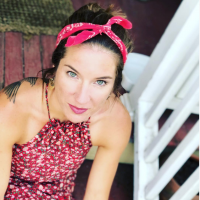Someone once told me that sea levels in the Atlantic are higher in the early fall due to warmer, expanding ocean water.
Growing up on an estuary in the Northeast, I had a front-row seat to the drama. Some days I’d look out the kitchen window, and the saline tide would be over the lip of our dilapidated dock, murkily threatening to drown the lawn. Then out it’d go again, occasionally leaving sun-bleached buoys and broken surfboards behind.
I think a lot about the debris that got stuck in the tangled marsh grass or wrapped around rotting dock pilings. It never occurred to me to dislodge it myself. The rubble was part of the landscape—a romantic ode to wreckage, waiting to be released with the next wave.
The estuary taught me how to witness the seasons change and observe marine ecosystems, but it also showed me what it means to get stuck, let go, and above all—that autumn is a time for tides to come and change everything.
It was mid-November of 2012 when I woke up on a plywood floor covered in weed dust and dirt in the hills of Northern California. The shed where I’d spent the night had previously been used to sort hundreds of pounds of marijuana for sellers to take East, but the workers had long since left for the season.
Everything in my body was itching or aching. I rolled over on my hands and knees, crawled to the shed’s door, and retched. It was cold, and I was dehydrated and shivering. Making my way to the generator, I prayed for there to be gas so I could turn on the heater. Sputtering clicks let me know it was dead. I lay there in the stillness of the grey morning, imagining a birdseye view of the broken shell I’d become.
After a few hours, the vomiting subsided. I got in my Jeep and drove down the bumpy, washed-out dirt road toward town for gas and supplies. There had been a storm the night before, and I had to get out several times to clear downed lichen-coated limbs that broke under the weight of the turbulence.
Gates separated the mountain I lived on to protect the pot farms from thieves or law enforcement; I could never decide which was more concerning. Reaching the first gate and stepping out of my Jeep, something shiny caught my eye. I could barely believe what I was looking at.
Battered and bent, it was the gold bangle bracelet my mom had gotten as a wedding gift and then passed down to me. I’d brought it to the farm a few years prior with a few other select, cherished items that should not have been on the illegal compound. The bracelet—and myself—had been lost for quite some time.
Tracing my finger along the bumpy ridges of the bangle, I noticed it had retained most of its shape, despite being run over countless times. I slipped it on my wrist when my TracFone rang. My boss told me he’d figured out how I could stay and work throughout the winter—an opportunity that had been waiting in the wings. As he paused for me to express my excitement, I thought about my morning; murky, low, and washed up.
“I need to go home for a while,” I replied without thinking twice.
Something dislodged on that fall morning and collided with an intuitive moment. I packed a few belongings and assured my boss I’d be back to plant in the spring, but I’d never return to the pot farm again. The tides had shifted, and I began my road to recovery.
To be continued…












Read 0 comments and reply